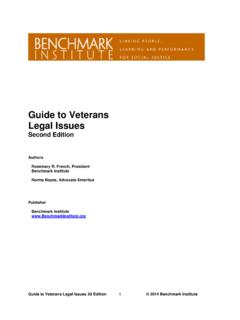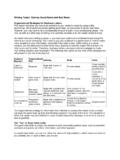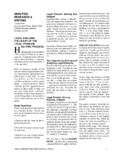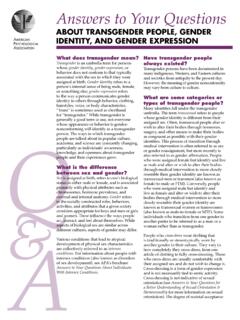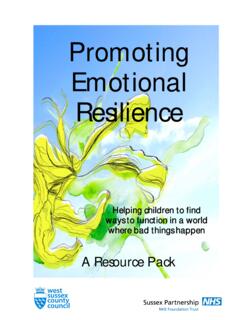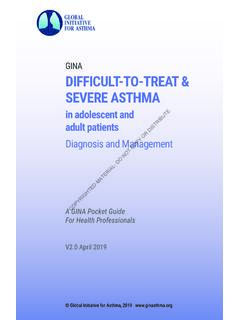Transcription of Dealing with Difficult Behavior - Benchmark Institute
1 Dealing with Difficult Behavior & The Maslow Need Hierarchy Being Needs SELF- ACTUALIZATION Pursue Inner Talent, Creativity, Fulfillment SELF-ESTEEM Achievement Mastery Recognition Respect Deficit Needs BELONGING LOVE Friends, Family, Spouse, Partner, Lover SAFETY Security, Stability, Freedom from Fear PHYSIOLOGICAL Food, Water, Shelter, Warmth Understanding why some clients engage in Difficult Behavior helps choose strategies to deal with the Behavior effectively. Psychologist Abraham Maslow's (1908 - 1970) need hierarchy suggests that unmet needs help explain Difficult Behavior patterns.
2 While doing research, Maslow noticed that some needs took precedence over others. For example, if hungry and thirsty, most people deal with thirst first, a stronger need than hunger. And even if extremely thirsty, but unable to breathe, everyone would agree that breathing trumps thirst. Maslow's theory holds that human beings are motivated by unsatisfied needs; lower needs take precedence over higher needs and must be satisfied first. When a need is mostly satisfied it no longer motivates and the next higher need takes its place. Maslow's theory offers insight about the motivations behind " Difficult " behaviors.
3 Many of our clients have unsatisfied needs in the hierarchy's first four levels. people who are homeless, for example, are focused at the most basic physiological needs. Many other clients are focused on safety needs. Their level of need has implications for what kind of information clients need from us, how we might deliver that information, and how they might react when we don't or can't deliver what they need. Physiological Needs Physiological needs are the very basic needs such as air, water, food, sleep, sex.
4 When unsatisfied we may feel sick, irritated, uncomfortable. These feelings motivate us to alleviate them as soon as possible to reestablish our equilibrium. Once alleviated, we are able focus on other things. Physiological Needs: can affect perception - when on a diet, we are preoccupied with food; can be satisfied, , by getting enough to eat, drink; at work, focuses us on the next pay check; if deprived, can cause illness, , lack of Vitamin D can result in rickets; if pathological, we can eat, drink too much or engage in hoarding behaviors. Safety Needs When physiological needs are largely satisfied, we become increasingly interested in finding safe circumstances, stability, and protection.
5 We might develop a need for structure, order, some limits. In many American adults, this needs set manifests itself in wanting a home in a safe neighbor-hood, some job security, or a good retirement plan. When safety needs are not met, we can't move to the next level. If one partner in a relationship is abusive to the other for example, the abused partner cannot move to the next level because of constant concern for safety. Love and belongingness have to wait until fear subsides. Safety needs: can affect our perception, , paranoia; can be satisfied, , getting a stable job; at work, focuses us on getting fringe benefits, dental insurance; if deprived, can lead to neurosis, insecurity; if pathological, can develop phobias such as agoraphobia.
6 Belonging - Love Needs When physiological needs and safety needs mostly are met, we begin to feel the need for friends, a partner, children, affectionate relationships, a sense of community. Humans have a desire to live and belong to groups including clubs, work groups, religious groups, family, gangs. We need to feel loved and accepted by others. Viewed negatively, we become increasing susceptible to loneliness and social anxieties. Belonging - Love Needs: can affect our perception, , singles vs.
7 Couples; can be satisfied; , good partnership or marriage; at work , we focus on getting a good boss and good working conditions if deprived, can lead to loneliness if pathological, can lead to antisocial Behavior . Esteem Needs Maslow posed two versions -- lower and higher esteem needs. Lower form needs are respect from others, for status, fame, glory, recognition, attention, reputation, appreciation, dignity, even dominance.
8 Higher form involves the need for self-respect, including such feelings as confidence, competence, achievement, mastery, independence, and freedom. Maslow considers this latter version a higher form because he considers self-respect as harder to lose than respect from others. Low self-esteem and an inferiority complex are negative versions of these needs. Maslow agreed with psychologist Alfred Adler's theory that self-esteem needs are at the root of many, if not most, psychological problems. This theory also assumes that the more basic physiological, safety and love-belonging needs are mostly satisfied.
9 Esteem needs: can affect our perception, , "I get no respect;" can be satisfied, , doing a job well; at work, can focus us on "employee of the month" awards; if deprived, can lead to feelings of inferiority; if pathological, can lead to depression. Self-Actualization Needs The need for self-actualization is "the desire to become more and more what one is, to become everything that one is capable of becoming." people can seek knowledge, peace, esthetic experiences, self-fulfillment.
10 Self-actualization needs: do not distort our perception as do other needs; when self-actualized, we more accurately perceive what exists; can never be satisfied -- when can you have enough truth, beauty, or justice? at work, focus on creativity, fulfillment; ways to increase employee enjoyment and satisfaction; if deprived, can cause feelings on lack of meaning in life, boredom; if pathological, metapathologies such as boredom, cynicism, alienation. Deficit Needs The first four levels -- physiological, safety, belonging, self-esteem -- Maslow calls deficit needs, or D-needs.

